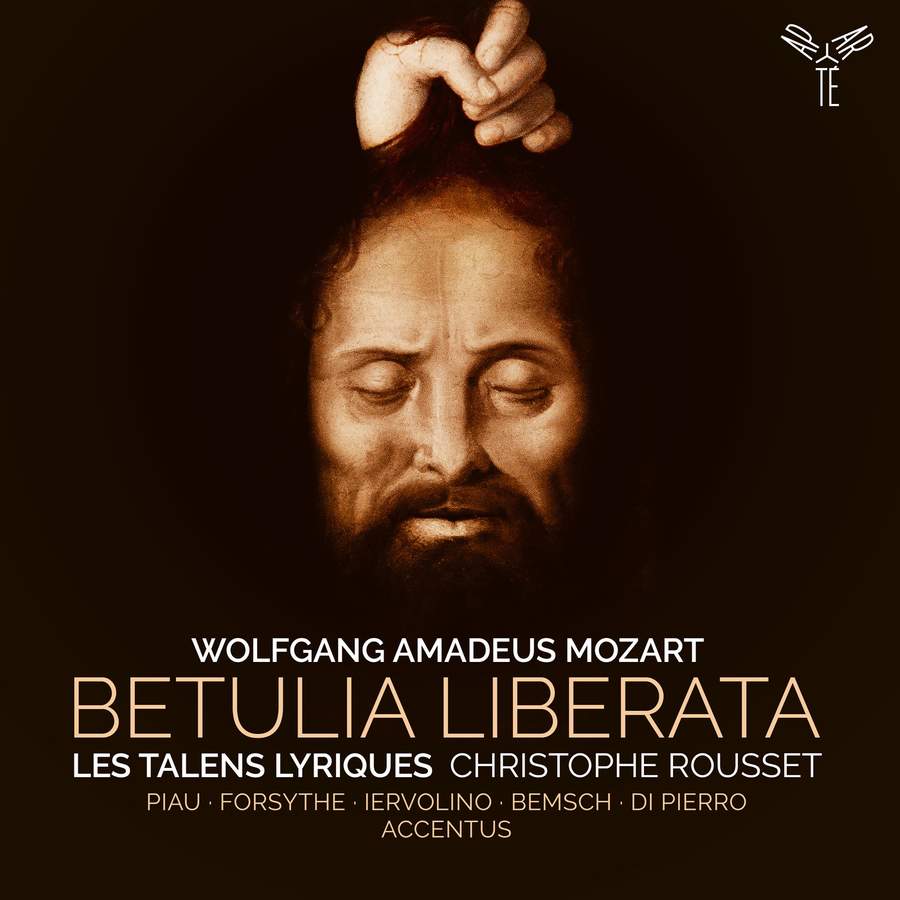MOZART Betulia liberata (Rousset)
View record and artist detailsRecord and Artist Details
Genre:
Vocal
Label: Aparte
Magazine Review Date: 11/2020
Media Format: CD or Download
Media Runtime: 131
Mastering:
DDD
Catalogue Number: AP235

Tracks:
| Composition | Artist Credit |
|---|---|
| (La) Betulia liberata |
Wolfgang Amadeus Mozart, Composer
(Les) Talens Lyriques Accentus Ensemble Amanda Forsythe, Cabri; Carmi, Soprano Christophe Rousset, Conductor Nahuel Di Pierro, Achior, Bass Pablo Bernsch, Ozia, Tenor Sandrine Piau, Amital, Soprano Teresa Iervolino, Giuditta, Mezzo soprano |
Author: Richard Wigmore
The story from the Apocrypha of the Israelite widow Judith’s murder of the Assyrian king Holofernes – repulsive or uplifting, according to taste – inspired reams of 18th-century oratorios, most famously Vivaldi’s Juditha triumphans. Composed for Padua in 1771 but probably never performed, Mozart’s only oratorio Betulia liberata sets Metastasio’s version of the story, in which, typically, drama takes second place to religious moralising. The climax here is less Judith’s triumphant return to Bethulia after performing the deed ‘offstage’ (banqueting Holofernes, then chopping off his head as he lies in a drunken stupor) than the conversion to the true faith of the Assyrian Achior.
The teenage Mozart could not wholly avoid the long-winded formality endemic to Metastasian oratorio. Gluck and Hasse are the evident models in a work predicated on lengthy, often virtuoso arias, interspersed with tracts of dry recitative. But by 1771 Mozart was becoming something more than a precocious musical mimic. Several numbers, especially those in the minor key, have a power and pathos that hint at the composer of Idomeneo a decade later.
Of a handful of earlier Betulia recordings, the pick are Leopold Hager, with a superb cast, and the period-instrument version directed by Michi Gaigg. Despite provisos, Christophe Rousset and his singers stand up pretty well to the competition. From the abrasive, fiercely accented D minor Overture, snarling horns to the fore, Rousset gets vividly coloured playing from his period band. Both sopranos are outstanding. As the Israelite noblewoman Amital, Sandrine Piau is brilliantly incisive in her ‘storm at sea’ aria (indispensable to any Metastasio libretto), and sings her final prayer for mercy with limpid beauty of tone and phrasing. The lighter-voiced Amanda Forsythe, in a pair of smaller roles, excels in two of the oratorio’s best arias, both in a minor key. A specialist in Rossini, the deep-toned contralto Teresa Iervolino makes Judith a more heroic figure than the pleasant but rather reticent Margot Oitzinger for Gaigg. Iervolino means business as she sallies forth on her mission in the bravura aria ‘Parto inerme’.
While tenor Pablo Bemsch, as the Israelite governor Ozias, and bass-baritone Nahuel Di Pierro, as Achior, have fine, resonant voices, forte tends to be their default setting. Di Pierro thunders imposingly in his aria describing the terrifying Holofernes but is less convincing in lyrical mode. He sounds stolid in Achior’s ‘conversion’ aria, turning what should be a graceful minuet into a dirge. Likewise, Bemsch makes rather a meal of his aria at the start of Part 2, dragged out to a ponderous 11'19" against under 8' in the rival recordings. Peter Schreier, for Hager, is a model here. Yet Bemsch, singing with firm, even tone, and Rousset vindicate their broad tempo for the impressive C minor prayer with chorus in Part 1. With rather livelier pacing and the best all-round cast, Hager would be my first choice for Mozart’s intermittently inspired oratorio. But there’s not much in it. Period instruments may sway it for some. I’m certainly glad to have heard this new recording, above all for the two sopranos and Teresa Iervolino’s formidable Judith.
Explore the world’s largest classical music catalogue on Apple Music Classical.
Included with an Apple Music subscription. Download now.

Gramophone Digital Club
- Digital Edition
- Digital Archive
- Reviews Database
- Events & Offers
From £9.20 / month
Subscribe
Gramophone Club
- Print Edition
- Digital Edition
- Digital Archive
- Reviews Database
- Events & Offers
From £11.45 / month
Subscribe
If you are a library, university or other organisation that would be interested in an institutional subscription to Gramophone please click here for further information.






